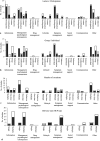A Systematic Review of Self-Management Interventions for Patients with Inflammatory Bowel Disease
- PMID: 37404383
- PMCID: PMC10315013
- DOI: 10.1159/000530021
A Systematic Review of Self-Management Interventions for Patients with Inflammatory Bowel Disease
Abstract
Introduction: Previous studies have reported the effectiveness of inflammatory bowel disease (IBD) self-management. However, it is unclear which types of self-management interventions are effective. We conducted a systematic literature review to clarify the status and efficacy of self-management interventions for IBD.
Methods: Searches were performed in databases including Embase, Medline, and Cochrane Library. Randomized, controlled studies of interventions in adult human participants with IBD involving a self-management component published in English from 2000 to 2020 were included. Studies were stratified based on study design, baseline demographic characteristics, methodological quality, and how outcomes were measured and analyzed for statistically significant improvements in outcomes, such as psychological health, quality of life, and healthcare resource usage.
Results: Among 50 studies included, 31 considered patients with IBD and 14 and 5 focused on patients with ulcerative colitis and Crohn's disease, respectively. Improvements in an outcome were reported in 33 (66%) studies. Most of the interventions that significantly improved an outcome index were based on symptom management and many of these were also delivered in combination with provision of information. We also note that among effective interventions, many were conducted with individualized and patient-participatory activities, and multidisciplinary healthcare practitioners were responsible for delivery of the interventions.
Conclusion: Ongoing interventions that focus on symptom management with provision of information may support self-management behavior in patients with IBD. A participatory intervention targeting individuals was suggested to be an effective intervention method.
Keywords: Inflammatory bowel disease; Quality of life; Remote monitoring; Self-management; Symptom management.
© 2023 The Author(s). Published by S. Karger AG, Basel.
Conflict of interest statement
M.I., L.H., M. Nakashoji, and A.T. are employees of Takeda Pharmaceutical Company and J.L.F. was an employee of Takeda Pharmaceutical Company; M.N. has served as a consultant for Takeda Pharmaceutical Company; J.L.F. owns restricted stocks in Takeda Pharmaceuticals and GlaxoSmithKline.
Figures




References
-
- Rees S, Williams A. Promoting and supporting self-management for adults living in the community with physical chronic illness: a systematic review of the effectiveness and meaningfulness of the patient-practitioner encounter. JBI Libr Syst Rev. 2009;7(13):492–582. 10.11124/01938924-200907130-00001. - DOI - PubMed
Publication types
LinkOut - more resources
Full Text Sources

